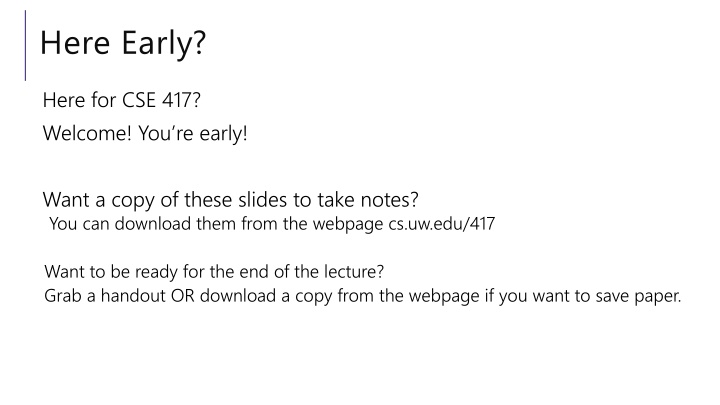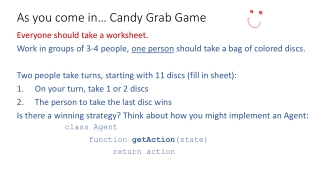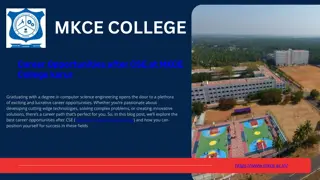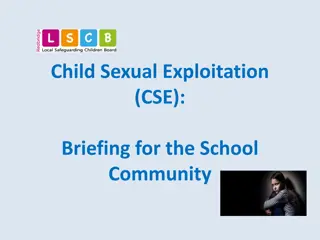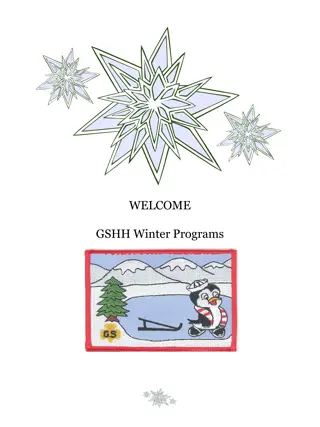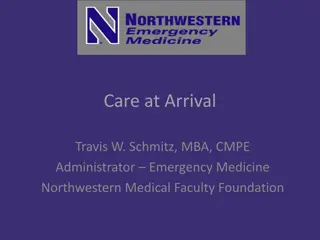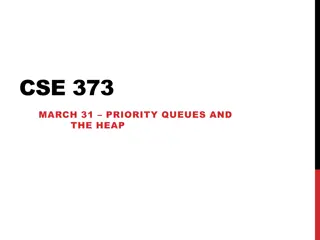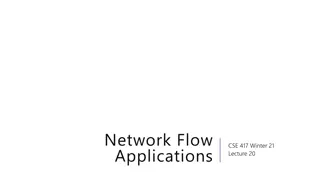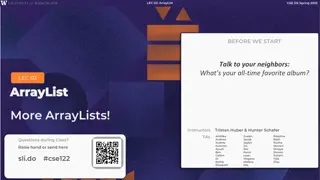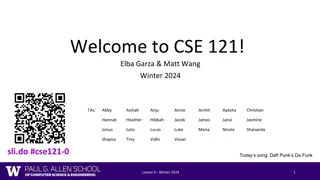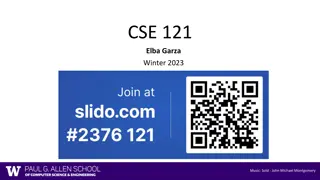Early Arrival at CSE 417 Winter '21 Lecture - Grab Your Copy!
Welcome to CSE 417 Winter '21 Lecture 1! Get ready for an informative session with insightful staff details, classroom logistics, and important to-dos. Ensure you're prepared by downloading slides and handouts from the webpage. Stay updated with syllabus and additional textbook resources. Engage in synchronous learning with engaging discussions and live interactions. Make the most of this opportunity to enhance your knowledge in algorithm design. Start your journey today by being prepared and engaged!
Download Presentation

Please find below an Image/Link to download the presentation.
The content on the website is provided AS IS for your information and personal use only. It may not be sold, licensed, or shared on other websites without obtaining consent from the author.If you encounter any issues during the download, it is possible that the publisher has removed the file from their server.
You are allowed to download the files provided on this website for personal or commercial use, subject to the condition that they are used lawfully. All files are the property of their respective owners.
The content on the website is provided AS IS for your information and personal use only. It may not be sold, licensed, or shared on other websites without obtaining consent from the author.
E N D
Presentation Transcript
Here Early? Here for CSE 417? Welcome! You re early! Want a copy of these slides to take notes? You can download them from the webpage cs.uw.edu/417 Want to be ready for the end of the lecture? Grab a handout OR download a copy from the webpage if you want to save paper.
Welcome CSE 417 Winter 21 Lecture 1
Today Logistics What is this course? Start of the content
Staff TAs Shefali Gupta Kasper Lindberg William Viet Nguyen Alicia Stepin Luna Wang Kenneth Wu Muru Zhang Instructor: Robbie Weber Ph.D. from UW CSE in theory Second year as teaching faculty Office: CSE2 311 Email: rtweber2@cs.washington.edu
Classroom Logistics We re in-person :D Please remember to wear a mask over your nose and mouth. You can briefly take off your mask for taking a sip of water. Please speak loudly for questions I ll repeat questions into the microphone (so everyone can hear/for the recording).
TODO List Make sure you re on Ed! (check your spam folder for an invite, if not there send an email to Robbie). Fill out the course background survey. Look at Homework 0 and 373 review materials.
Syllabus It s all on the webpage: https://courses.cs.washington.edu/courses/cse417/21au/ In general, we re designing lecture to be synchronous (taking questions live, time for student discussions). But we re trying to make sure if you need to stay home for a few days on short notice the effect will be minimal. We won t have exams, and lectures are recorded, so there s no requirement to come in-person. getting to know you form is out please fill out by Friday.
Textbook Optional: Optional: Algorithm Design by Kleinberg & Tardos It s a good introduction, and nice as a reference. There are lots of other books: Introduction to algorithms by Cormen, Leiserson, Rivest, Stein One free reference: Algorithms by Jeff Erickson Algorithms.wtf All are theoretical (expect more math background than 373). Additional resource: Lecture videos by Tim Roughgarden (Algorithms Illuminated) Not a perfect match of topics, but math background matches.
Logistics Work Your grade will be based (only) on homework assignments. We won t have any exams.
Logistics Work This quarter we re trying an experiment based on mastery grading Basic idea: Don t grade for points Every assignment will have a few more problems on it than we expect you to do. You ll choose which to do. Instead of assigning exact points, Every problem gets a score of: Excellent Main idea and edge cases are all correct. Would have gotten full credit (or extremely close) with points-based grading. Satisfactory Main idea is correct, but some edge cases or follow-up questions are wrong or missing. Would have gotten about 80-90% on points-based grading. Not Satisfactory Some important error is made, but substantial progress toward a solution. Would have gotten above 50% on points-based grading. Ungraded Directions not followed (e.g., used a library that isn t permitted) or otherwise shows no substantial progress.
Logistics Work Minimums for grade breaks are already posted. Why? We care if you understand the content by the end of the quarter, not right away. We d like to give you more chances to show your understanding. But we also need to make sure the TAs have enough time to grade everything. Switching from points to E/S/N/U lets them grade faster, and therefore to regrade submissions.
Logistics Lecture Activities I m going to be teaching with active learning Why? Because it works. https://www.pnas.org/content/111/23/8410 a meta-analysis of 225 studies. Just listening to me isn t as good for you as listening to me then trying problems on your own and with each other. The answers live help me adjust explanations. active learning in this course. There aren t points associated with completing the activities.
Logistics where to go? Slides, homework problems, etc. go up on the webpage Homework submission on gradescope Live lecture activities on polleverywhere Questions on Ed discussion board Don t trust canvas we won t be updating frequently. We ll tell you when we re using it for specific purposes.
Late Policy The resubmit option is the late policy it s intended to help with normal in-quarter difficulties (you might do one or two fewer problems the week you have a midterm in another course, for example). If you have an unexpected situation that is going to interfere with your ability to work for an extended period of time (e.g., extended illness or family responsibilities) please send Robbie an email as soon as possible and we ll figure out what to do.
Hey, Were in a pandemic The staff is going to do our best to help you learn. Real life is going to get in the way. If it does, tell us as soon as possible, and we ll work with you. I don t need to know private details, just enough to know it s an emergency and how to help. We will endeavor not to make any substantial changes to the syllabus. But if something extremely unexpected happens we reserve the right to make changes. Generally prefer individual accommodations, rather than course-wide ones.
What is this course? Algorithms and Computational Complexity themes: Design Techniques not just here s an algorithm but here s a way of thinking about a class of algorithms Modeling In the real world, no one will say I need you to run Prim s algorithm on this graph they will say I need you to choose where to build electrical wires so every town is connected to the power plant as cheaply as possible Set realistic expectations there are some things we (think/know) computers can t do efficiently. How do you recognize these problems? Reductions if you ve already solved a problem, don t solve it again (reuse ideas) and if you know you can t solve a problem, what else can t you solve.
What is this course not NOT: A list of the fastest-known algorithms for common problems. I m not concerned with which library is best. The best library changes over time and by language. I m not qualified to keep a list. I want you to find this course useful 5 years from now. And the best theoretical algorithms probably aren t practical and when they are, it s often clever combinations/complicated variants of big ideas that we ll see.
Course Topics (Tentative) Stable Matchings Graph Algorithms from 373 (BFS/DFS, MST algorithms, shortest paths) Divide & Conquer Dynamic Programming Network Flow Linear Programming P/NP Approximation Algorithms (applications of all the prior big ideas)
Whats Coming Up This week: An extremely useful algorithm. That has had lots of effect on the real world. Along the way: what constitutes a convincing argument that my algorithm works? We ll learn: direct arguments, proof by contradiction, and some fundamental logic. Already know that? You ll get to learn a fun algorithm along the way! Don t know them yet? The introduction will be fast! More resources on the webpage, and practice on the first assignment.
Stable Matchings Motivation: You have to assign TAs to instructors. Two groups of people you need to pair off, with preferences about their matches. You can t make everyone happy so at least ensure that everyone listens to you. There are lots of other similar applications Assign doctors to the hospitals where they do residency. Assign high schoolers to magnet schools. Among many, many other applications.
Motivation The real world is complicated. Students shouldn t TA a course they haven t taken. Instructors need varying numbers of TAs. There are more TA applicants than positions. Doctors might want to be in the same city as their partner. We re going to simplify away the real world constraints. The core ideas have been adapted to all of these scenarios.
Stable Matching Problem To simplify. We have two sets: A set of ? horses, and a set of ? riders. Every rider can ride any horse, and vice versa. We just need to pair them off. What could go wrong?
Stable Matching Problem Given two sets R = ?1, ,??,? = { 1, , ?} each agent ranks every every agent in the other set. Goal: Match each agent to exactly one their preferences. How do we respect preferences ? Avoid blocking pairs: unmatched pairs (?, ) where ? prefers to their match, and prefers ? to its match. ? , exactly one agent in the other set, respecting ?,? ?
Stable Matching, More Formally Perfect matching: Each rider is paired with exactly one horse. Each horse is paired with exactly one rider. Stability: no ability to exchange an unmatched pair ?- is blocking if they both prefer each other to current matches. Stable matching: perfect matching with no blocking pairs. Stable Matching Problem Given: the preference lists of ? riders and ? horses. Find: a stable matching.
Lecture Activity To make sure you ve got the definition: 1. Download the activity pdf from the webpage (it s just the next slide in this slide deck) or look at the physical handout. 2. Introduce yourself to those around you. 3. Try the problem. 4. Fill out the polleverywhere
Try it! Why are these not stable matchings? ?1 1 ?1 ,?2 ?1 1 , 2 1 ?1 ,?2 1 , 2 ?2 2 ?1 ,?2 1 , 2 ?2 2 ?1 ,?2 1 , 2 Find a stable matching for this instance. ?1 ?1 ,?2,?3 1 1 , 2, 3 ?2 2 2 , 1, 3 ?1 ,?2,?3 1 , 2, 3 ?3 3 ?1 ,?2,?3
Questions Does a stable matching always exist? Can we find a stable matching efficiently? We ll answer both of those questions in the next few lectures. Let s start with the second one.
Idea for an Algorithm Key idea Unmatched riders propose to the highest horse on their preference list that they have not already proposed to. Send in a rider to walk up to their favorite horse. Everyone in front of a different horse? Done! If more than one rider is at the same horse, let the horse decide its favorite. Rejected riders go back outside. Repeat until you have a perfect matching.
Gale-Shapley Algorithm Initially all ? in ? and in ? are free While there is a free ? Let be highest on ? s list that ? has not proposed to if is free, then match (?, ) else // is not free suppose (? , ) are matched if prefers ? to r unmatch (? , ) match (?, )
Algorithm Example ?1 1 ?2 ,?3,?1 1 , 2, 3 ?2 2 1 , 3, 2 ?3 ,?1,?2 3 1 , 2, 3 ?3 ?3 ,?1,?2 Proposals: ?1,?2,?1,?3,?3,?1
Does this algorithm work? Does it run in a reasonable amount of time? Is the result correct (i.e. a stable matching)? Begin by identifying invariants and measures of progress Observation A: r s proposals get worse for them. Observation B: Once h is matched, h stays matched. Observation C: h s partners get better. How do we justify these? A one-sentence explanation would suffice for each of these on the homework. How did we know these were the right observations? Practice. And editing we wouldn t have found these the first time, but after reading through early proof attempts.
TODO List Make sure you re on Ed! (check your spam folder for an invite, if not there send an email to Robbie). Fill out the course background survey. Look at Homework 0 and 373 review materials.
